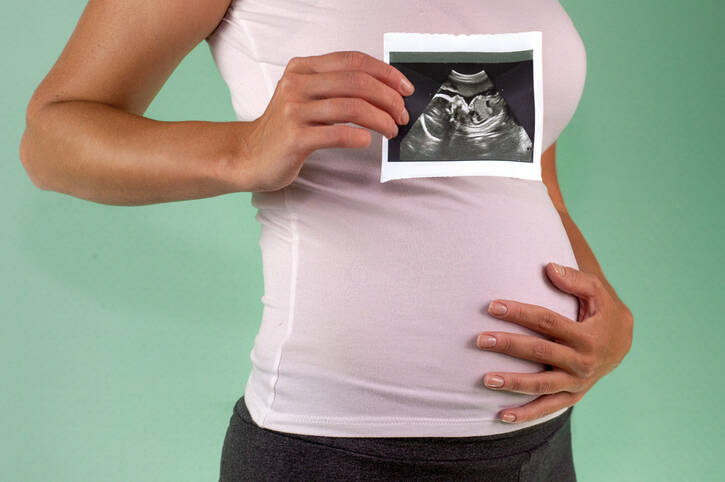- wikiskripta.eu - Fetal blood circulation
- wikiskripta.eu - Constipation
- whattoexpect.com
16th week of pregnancy: what will the ultrasound show? How is the future mommy doing?

At 16 weeks of pregnancy, you are almost halfway through the journey called pregnancy. There are more examinations to come. There may be some difficulties caused by pregnancy. Which ones are they?
Article content
Some clinics that work with such ultrasound can even take a video of your baby. However, the main and most important diagnostic tool for the doctor is still the standard 2D ultrasound.
Are you experiencing lower abdominal pain? Read the article:
Are youpregnant and experiencing lower abdominal pain?
Baby at 16 weeks of pregnancy
Your baby is now approximately 12-17 cm in size and weighs about 100-120 grams.
The back muscles are getting stronger and the spine is slowly straightening out. The body structure is still taking on a more natural shape.
The baby's skin is still fat-free. It is very thin and translucent. You can see the baby's blood vessels through it.
The baby's hearing is developed and it is said that it can already recognise different sounds and melodies. You can play lullabies, nursery rhymes or sing to it.
The baby can make small side-to-side eye movements. He can even perceive light, even though his eyes are still closed.
She's getting better at sucking. She's getting ready to breastfeed by sucking her thumb.
The baby's heart and circulatory system are fully functioning. But the fetal circulation is different. The placenta is a substitute for the lungs. The baby's lungs don't contain oxygen, they contain fluid.
Oxygenation takes place in the placenta and the fetal circulation functions with the help of various anatomical adaptations.
Everything changes after birth, when certain pressure changes occur in the baby's circulation and the lungs take over their function.
The table shows the approximate measurements of the fetus at 16 weeks, taken with a sonographer
| Total length | CRL Distance from vertex to coccyx | Weight | HC Head circumference | BPD Transverse head diameter | AC Abdominal circumference | FL Femur length |
| 17 cm | 116 mm | 100 g | 122.9 mm | 35,7 mm | 103,2 mm | 19.5 mm |
Read more about fetal size in the article:
Ultrasound in pregnancy: fetal size, what is fetal biometry?
Mom at 16 weeks of pregnancy
If you are still trying to hide your pregnant belly, things are certainly getting more complicated. The fast-growing fetus is a major contributing factor.
Remember that every pregnancy is different. Every woman's figure is different. So don't compare yourself to other pregnant women. If you are unsure, talk to your doctor.
Read our article:
How much to gain during pregnancy? What does it depend on and what to look out for?
Weight gain and diet during pregnancy
A varied and healthy diet is very important for a pregnant woman, the fetus and the life of the newborn.
A wholesome diet should contain all the important components. These are: proteins, fats, carbohydrates, vitamins and fibre.
Protein is important for the formation and growth of tissues. It is essential that at least half of the total protein intake should be protein of animal origin.
Fats are needed in pregnancy for the proper development of the fetal organs and the function of the placenta. They should consist mainly of unsaturated fats and omega-3 fatty acids.
Read an interesting article not only for pregnant women:
Our body needs omega-3 fatty acids. Do we get enough of them?
Choose wholesome foods. Eat more often and in smaller quantities.
Weight loss in pregnancy and reduction diets are not advisable. In some cases, they can lead to fetal harm and premature birth.
Also, beware of high-calorie diets. This in turn leads to obesity, gestational diabetes and high blood pressure.
Prefer carbohydrates in the form of vegetables. Simple carbohydrates are too calorific.
Continue to avoid foods such as:
- empty calories with no nutritional value - chips, sweets
- uncooked meat
- mould cheese
- alcohol
- cigarettes
You may also be interested in this article:
Essential nutrients in the human diet: what are proteins, sugars, fats?
Constipation in pregnancy
Right from the beginning of pregnancy, bloating, gas or constipation is a common problem.
With rising progesterone levels, intestinal problems become even more pronounced. The developing pressure of the fetus on the abdominal organs and the reduced secretion of the stomach contribute to this.
The hormone progesterone relaxes the muscles of the uterus, but also the walls of the intestines. This slows the passage of intestinal contents.
Other factors affecting digestion:
- change in the diet of pregnant women
- taking certain medications and supplements, such as iron, calcium
- lack of exercise
- lack of fluids
- stress, mental strain
Medication as a treatment for indigestion is more of a last resort. Before reaching for such a solution, try to adjust your diet and lifestyle.
Include plenty of exercise in your daily regime and avoid foods that cause constipation and bloating.
Read more about constipation and foods that can worsen digestion in the article:
Dangerous constipation in pregnancy?
Vaginal discharge
During pregnancy, increased vaginal discharge occurs quite often. Hormonal changes, especially increased levels of estrogen, cause increased blood supply to the organs in the pelvic area. The richly blooded mucous membrane of the female genital organs leads to increased production of vaginal discharge.
It occurs both at the beginning and at other stages of pregnancy. Although it is a rather unpleasant affair, it has its importance. Such discharge protects the birth canal from infection and maintains the bacterial balance in the vagina.
A weak white or watery discharge in pregnancy is natural. However, you should be alert if the discharge has a thicker or lumpy consistency or smells foul. It may be an infection. Often, it is also manifested by itching in the private parts.
Some vaginal infections may pose a risk to the foetus or may lead to premature birth. Therefore, if you have any doubts, do not hesitate to consult your doctor.
Read more about discharge problems in the article:
Vaginal discharge and change in colour, smell or consistency = a problem?
Back pain
Back pain makes pregnancy uncomfortable for many mothers. The baby is growing at a fast pace and your body has to adapt to this.
The pelvic ligaments and muscles relax, the uterus enlarges and the entire centre of gravity shifts forward. The lower spine curves and adapts to the resulting strain.
The result is stiffness and soreness of the back muscles.
To prevent or relieve pain, avoid sitting for long periods of time or lifting heavy loads. During the day, try to stretch and stretch your muscles and spine. Take a walk or have a pregnancy massage or a warm bath.
A gymnastics ball is a great tool to help you relax your spine. Sit on it and keep your back straight. Keep your feet flat on the floor. Slowly move your pelvis back and forth. You can also add a sideways movement.
However, exercise carefully and preferably under professional supervision. You will find various classes and exercises in your area aimed at mums-to-be.
Under supervision, you can work with your pelvic floor, strengthen and relax your body and prepare for the birth itself.
For many mums-to-be, movement is an essential part of pregnancy. Healthy and natural movement is part of life and pregnancy should not be a barrier.
Examination at 16 weeks of pregnancy
Sometime around the 16th week of pregnancy, you will again attend one of the many pregnancy clinics. At this clinic, you will have your blood pressure and urine tested, your weight checked, and you may have another ultrasound.
If you have not already done so, your doctor will take blood for a so-called tripple test. This is a screening blood test that can detect the risk of developmental abnormalities in the baby.
Your blood will also be taken for a blood group and Rh factor test, as well as a blood count.
Read more about the other weeks of pregnancy in this summary article:
Pregnancyby weeks. How does pregnancy and fetal development work?
Interesting resources
Related










